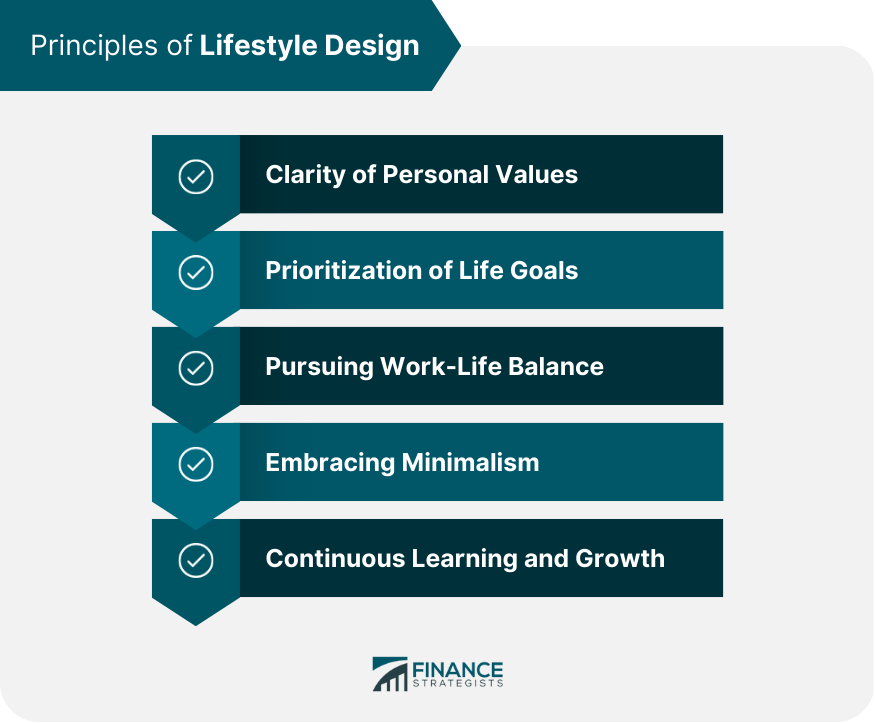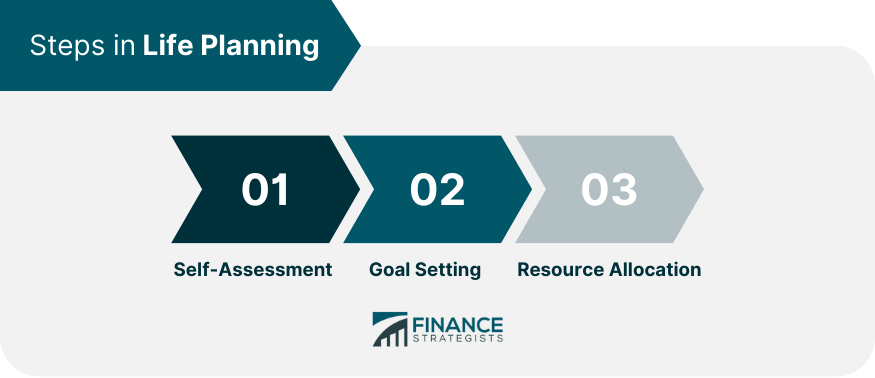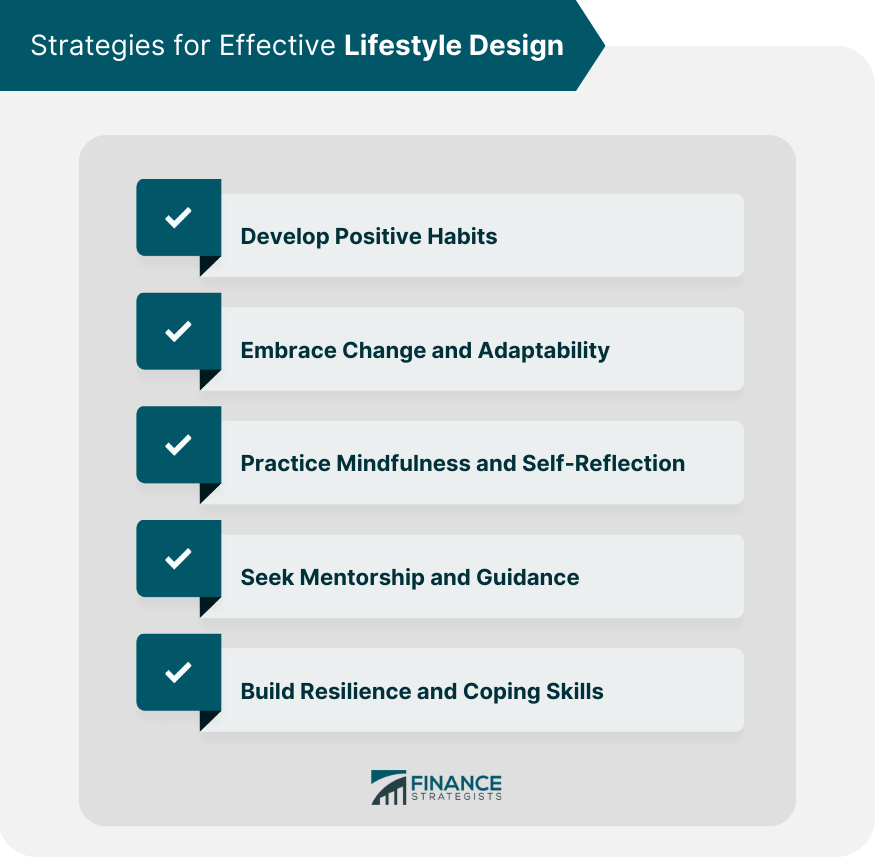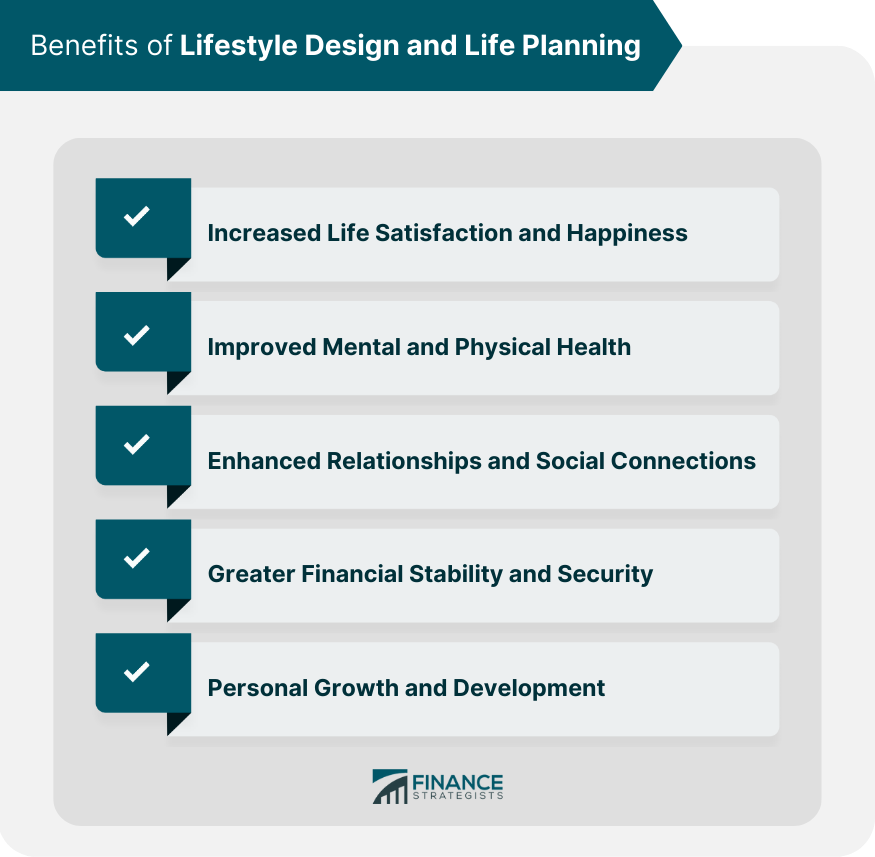Lifestyle design and life planning are holistic approaches to organizing and shaping one's life based on personal values, goals, and aspirations. These processes involve making deliberate choices to create a life that aligns with one's unique vision of success and happiness. Lifestyle design and life planning are essential for achieving a fulfilling, purpose-driven, and balanced life. They enable individuals to take control of their lives, prioritize what truly matters, and make informed decisions that lead to personal growth and well-being. This article will discuss the principles of lifestyle design, steps in life planning, and strategies for implementing these concepts in various aspects of one's life. The goal is to provide a comprehensive guide for creating a life that aligns with one's values and aspirations. Gaining clarity on personal values is a foundational step in lifestyle design. It involves identifying and understanding the guiding principles that shape one's decisions, actions, and overall life direction. Prioritizing life goals is crucial for creating a meaningful and purpose-driven life. This principle involves setting clear, achievable objectives that align with one's values and contribute to personal growth and satisfaction. Achieving work-life balance is a vital aspect of lifestyle design. It involves allocating time and energy between professional and personal responsibilities, ensuring that both areas of life receive adequate attention and care. Minimalism is a lifestyle design principle that focuses on simplicity and intentionality. By embracing minimalism, individuals can reduce clutter, stress, and unnecessary distractions, making room for what truly matters in their lives. Lifestyle design emphasizes the importance of continuous learning and personal growth. This principle encourages individuals to seek new experiences, expand their skill sets, and embrace challenges to become the best version of themselves. A thorough self-assessment begins with identifying one's skills and strengths. Understanding these attributes enables individuals to capitalize on their talents and pursue opportunities that align with their abilities. Exploring one's interests and passions is crucial for developing a fulfilling life plan. By recognizing what truly excites and motivates them, individuals can make choices that lead to a more engaged and purposeful life. Acknowledging one's limitations and weaknesses is essential for self-awareness and personal growth. Identifying areas of improvement helps individuals set realistic goals and develop strategies to overcome obstacles. Short-term goals are essential for maintaining motivation and providing a sense of accomplishment. These objectives typically span a few weeks to months and serve as stepping stones toward long-term goals. Long-term goals are the overarching objectives that provide direction and purpose in life planning. These goals may take years to achieve and often require significant effort, commitment, and perseverance. SMART goals are specific, measurable, achievable, relevant, and time-bound objectives. By setting SMART goals, individuals can create a clear roadmap for success and monitor their progress along the way. Effective time management is crucial for achieving a well-balanced and productive life. By prioritizing tasks, setting boundaries, and establishing routines, individuals can make the most of their time and accomplish their goals. Financial planning is an essential component of life planning, as it involves managing resources to achieve short-term and long-term goals. This process includes budgeting, saving, investing, and protecting assets to ensure financial stability and security throughout one's life. Building a strong support network is vital for life planning success. Friends, family, mentors, and professionals can provide encouragement, guidance, and resources to help individuals overcome challenges and achieve their goals. Developing positive habits is crucial for sustainable lifestyle design. By adopting healthy routines and behaviors, individuals can improve their well-being, productivity, and overall life satisfaction. Change is inevitable, and embracing adaptability is key to effective lifestyle design. By cultivating a growth mindset and being open to new experiences, individuals can thrive in the face of change and make the most of life's opportunities. Mindfulness and self-reflection are essential tools for lifestyle design. By practicing self-awareness and staying present at the moment, individuals can make more intentional choices that align with their values and goals. Mentorship and guidance can provide valuable insights and support in the lifestyle design process. By seeking advice from experienced individuals, one can learn from their expertise and avoid potential pitfalls on the path to success. Resilience and coping skills are crucial for overcoming challenges and setbacks in life. By developing mental and emotional strength, individuals can persevere through difficult times and emerge stronger. Regular check-ins and self-evaluations are essential for monitoring progress and ensuring that one's life plan remains on track. By reflecting on successes and challenges, individuals can make informed adjustments to their goals and strategies. Life is unpredictable, and adapting to changing circumstances is crucial for maintaining progress toward one's goals. By being flexible and open to change, individuals can stay aligned with their values and aspirations, even when faced with unexpected obstacles. Recognizing and celebrating milestones and achievements is essential for maintaining motivation and fostering a sense of accomplishment. By acknowledging progress, individuals can build confidence and maintain momentum toward their goals. As life evolves, revisiting and revising goals to ensure they remain relevant and aligned with one's values is crucial. Periodic reassessment allows individuals to refine their life plans and make necessary adjustments to stay on track. Setbacks and failures are inevitable, but they can provide valuable learning opportunities. By reflecting on these experiences, individuals can gain insights, build resilience, and develop strategies for future success. Lifestyle design and life planning can lead to increased life satisfaction and happiness by promoting a sense of purpose, control, and alignment with one's values. Pursuing a balanced and intentional life can have a positive impact on mental and physical health, as individuals prioritize self-care, stress reduction, and overall well-being. Lifestyle design encourages the development of strong relationships and social connections by fostering a focus on shared values, open communication, and meaningful interactions. Financial planning, an integral part of life planning, can help individuals achieve greater financial stability and security by managing resources effectively and setting achievable financial goals. Lifestyle design and life planning promote personal growth and development by encouraging continuous learning, self-reflection, and embracing new experiences. These processes foster a growth mindset and help individuals become the best version of themselves. Lifestyle design and life planning are holistic approaches that involve deliberate choices to create a fulfilling, purpose-driven, and balanced life. Lifestyle design principles include clarity of personal values, prioritization of life goals, pursuing work-life balance, embracing minimalism, and continuous learning and growth. Steps in life planning include self-assessment, goal setting, and resource allocation. Effective lifestyle design strategies include developing positive habits, embracing change and adaptability, practicing mindfulness and self-reflection, seeking mentorship and guidance, and building resilience and coping skills. The benefits of lifestyle design and life planning include increased life satisfaction and happiness, improved mental and physical health, enhanced relationships and social connections, greater financial stability and security, and personal growth and development.What Is Lifestyle Design and Life Planning?
Principles of Lifestyle Design

Clarity of Personal Values
Prioritization of Life Goals
Pursuing Work-Life Balance
Embracing Minimalism
Continuous Learning and Growth
Steps in Life Planning

Self-Assessment
Skills and Strengths
Interests and Passions
Limitations and Weaknesses
Goal Setting
Short-Term Goals
Long-Term Goals
SMART Goals
Resource Allocation
Time Management
Financial Planning
Support Network
Strategies for Effective Lifestyle Design

Developing Positive Habits
Embracing Change and Adaptability
Practicing Mindfulness and Self-Reflection
Seeking Mentorship and Guidance
Building Resilience and Coping Skills
Monitoring and Adjusting Life Plans
Regular Check-Ins and Self-Evaluation
Adapting to Changing Circumstances
Celebrating Milestones and Achievements
Revisiting and Revising Goals as Needed
Learning from Setbacks and Failures
Benefits of Lifestyle Design and Life Planning

Increased Life Satisfaction and Happiness
Improved Mental and Physical Health
Enhanced Relationships and Social Connections
Greater Financial Stability and Security
Personal Growth and Development
Final Thoughts
Lifestyle Design and Life Planning FAQs
Lifestyle design is the process of shaping one's life based on personal values, goals, and aspirations, while life planning is the systematic approach to organizing and implementing the necessary steps to achieve a desired lifestyle. Both concepts work together to help individuals create a fulfilling, purpose-driven, and balanced life.
Lifestyle design and life planning foster personal growth by encouraging continuous learning, self-reflection, and embracing new experiences. These processes help individuals develop a growth mindset, prioritize their values and goals, and make informed decisions that contribute to their overall well-being and happiness.
To incorporate lifestyle design and life planning into your daily routine, begin by assessing your values, strengths, and interests. Set clear, achievable short-term and long-term goals, and develop strategies for effectively managing your time, finances, and support network. Cultivate positive habits, embrace change, and practice mindfulness to make more intentional choices in your everyday life.
Yes, lifestyle design and life planning can enhance relationships and social connections by fostering a focus on shared values, open communication, and meaningful interactions. By aligning your life with your values, you can attract like-minded individuals and build strong, supportive relationships.
Setbacks and obstacles are a natural part of the lifestyle design and life planning process. When faced with challenges, practice resilience and utilize your coping skills to overcome them. Reflect on your experiences, learn from your setbacks, and adjust your goals and strategies as needed to continue making progress towards your desired lifestyle.
True Tamplin is a published author, public speaker, CEO of UpDigital, and founder of Finance Strategists.
True is a Certified Educator in Personal Finance (CEPF®), author of The Handy Financial Ratios Guide, a member of the Society for Advancing Business Editing and Writing, contributes to his financial education site, Finance Strategists, and has spoken to various financial communities such as the CFA Institute, as well as university students like his Alma mater, Biola University, where he received a bachelor of science in business and data analytics.
To learn more about True, visit his personal website or view his author profiles on Amazon, Nasdaq and Forbes.















